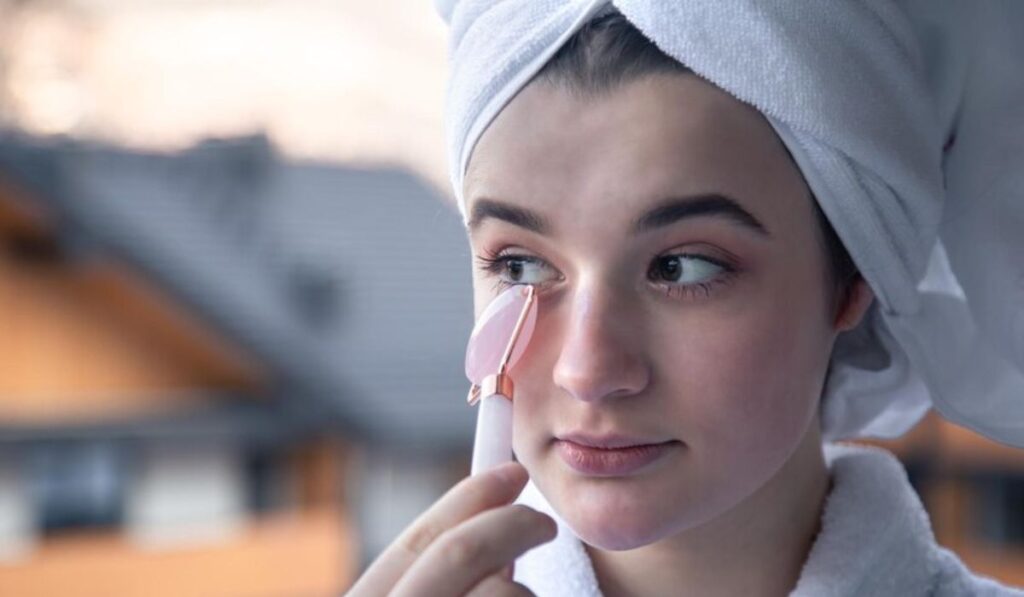Sensitive skin tends to be a handful at times, reacting to environmental factors, skincare products, or even diet. For someone with sensitive skin, the focus is on soothing, healing, and protecting. In this blog, we will highlight the basics of the best skincare for sensitive skin and how you can introduce effective products into your routine to maintain a glowing complexion. We also discuss how sensitive skin relates to dark spots and how to find the best dark spot remover without causing further irritation.
Get ready to explore the world of sensitive skincare and build a regimen that nurtures healthy skin. Check it out here https://www.mytouchskincare.com/collections/skin-care-for-sensitive-skin
Decoding Sensitive Skin: What Causes It?
Sensitive skin refers to a type that reacts more easily to various stimuli, leading to discomfort, redness, itching, or stinging. These reactions can be brought on by environmental factors, aggressive skincare products, or underlying conditions. Here are the most common causes of sensitive skin:
Harsh Chemicals in Skincare Products
Many mainstream products contain irritants like fragrances, alcohol, parabens, and sulfates. These chemicals strip away the skin’s protective barrier, leading to dryness and inflammation.
Weather Conditions
Extreme cold or heat can be harsh on sensitive skin. Cold winds cause dryness, while high humidity or sun exposure can lead to oil production and breakouts.
Allergies
Sensitivity can result from allergies to certain ingredients, materials, or foods. These may cause flare-ups, irritation, and discomfort.
Over-Exfoliation
Exfoliating too often or with harsh products can aggravate sensitive skin. It’s essential to exfoliate gently and in moderation to avoid damaging the skin barrier.
Skin Conditions
Conditions like rosacea, eczema, or psoriasis make the skin more reactive, requiring special care and products to prevent irritation.
Building a Skincare Routine: Sensitive Skin
A skincare routine for sensitive skin should focus on gentleness, soothing, and avoiding common irritants. Here’s a step-by-step guide to creating an effective routine for sensitive skin:
Use a Gentle Cleanser
Cleansing is essential, but sensitive skin needs a sulfate-free formula with hydrating ingredients like aloe vera, glycerin, or colloidal oatmeal that won’t strip away essential oils.
Choose an Alcohol-Free Toner
Toners help balance pH, but many contain alcohol, which is too harsh for sensitive skin. Opt for alcohol-free toners with calming ingredients like chamomile, witch hazel, or rose water.
Apply a Hydrating Serum
Hydration is key for sensitive skin. Look for serums with hyaluronic acid, niacinamide, or aloe vera. These ingredients lock in moisture and soothe irritation.
Moisturize with a Lightweight Cream
Even sensitive skin needs moisture to maintain a healthy barrier. Choose lightweight, non-comedogenic moisturizers with ceramides, squalane, or shea butter to nourish and repair without clogging pores.
Sunscreen is Essential
UV rays can easily damage sensitive skin, so daily sunscreen is non-negotiable. Mineral-based sunscreens with zinc oxide or titanium dioxide are gentler than chemical sunscreens.
Sensitive Skin and Dark Spots: Related Issues
In addition to irritation and redness, sensitive skin can also suffer from dark spots or hyperpigmentation. For those with sensitive skin, acne breakouts, irritation, or sun damage may lead to post-inflammatory hyperpigmentation (PIH), where dark spots form as the skin heals.
Delicate Balance: Dark Spots and Sensitive Skin
Treating dark spots on sensitive skin can be tricky because many dark spot removers contain active ingredients that may cause irritation. This makes it crucial to find a dark spot remover that’s specifically formulated for sensitive skin.
Best Ingredients for Sensitive Skin to Remove Dark Spots
The ingredients in a dark spot remover for sensitive skin should be gentle but effective. Here are the best options for fading hyperpigmentation without causing irritation:
Vitamin C
A skin-brightening antioxidant that inhibits melanin production and fades dark spots. It’s gentle enough for sensitive skin, especially when paired with hydrating ingredients.
Niacinamide (Vitamin B3)
This wonder ingredient reduces inflammation, minimizes redness, and fades dark spots while improving the skin’s barrier.
Licorice Root Extract
A natural ingredient that lightens dark spots and soothes irritation, ideal for sensitive skin due to its anti-inflammatory properties.
Azelaic Acid
A naturally occurring acid that fights acne, reduces inflammation, and lightens hyperpigmentation. Suitable for sensitive skin, it’s often prescribed for conditions like rosacea.
How to Incorporate Dark Spot Removers into Your Routine
When adding a dark spot remover to your routine, go slowly to avoid overwhelming sensitive skin. Here’s how:
Start Slowly
Apply the dark spot remover every other day to see how your skin reacts. Gradually increase usage as your skin adjusts.
Replenish with Soothing Formulas
Follow up with a soothing moisturizer that includes ceramides or squalane to protect the skin barrier.
Protect with Sunscreen
Sunscreen is vital when treating dark spots, as UV exposure can worsen hyperpigmentation. Use a mineral sunscreen with at least SPF 30.
Be Patient
Dark spots take time to fade. Consistency is key, and it may take weeks or months to see significant improvement.
Additional Tips for Sensitive Skin Care
Sensitive skin needs extra care to prevent further irritation. Here are a few tips:
- Patch Test: Always patch test new products to ensure they won’t cause a reaction.
- Limit Exfoliation: Avoid physical scrubs and opt for gentle chemical exfoliants like lactic acid.
- Use Lukewarm Water: Hot water can strip the skin of natural oils, so wash with lukewarm water.
- Stay Hydrated: Drink plenty of water to keep your skin hydrated from the inside out.
- Avoid Fragrances: Fragrance in skincare products can irritate sensitive skin, so opt for fragrance-free formulations.
Conclusion
The best skincare routine for sensitive skin is one that soothes, hydrates, and protects. It’s important to understand the relationship between sensitive skin and dark spots to avoid improper treatment. With the right ingredients and consistency, you can achieve calm, healthy, and even-toned skin.
For dark spots, choose a remover with gentle ingredients like niacinamide, licorice root, or vitamin C. With patience and care, you’ll achieve a glowing, irritation-free complexion.







